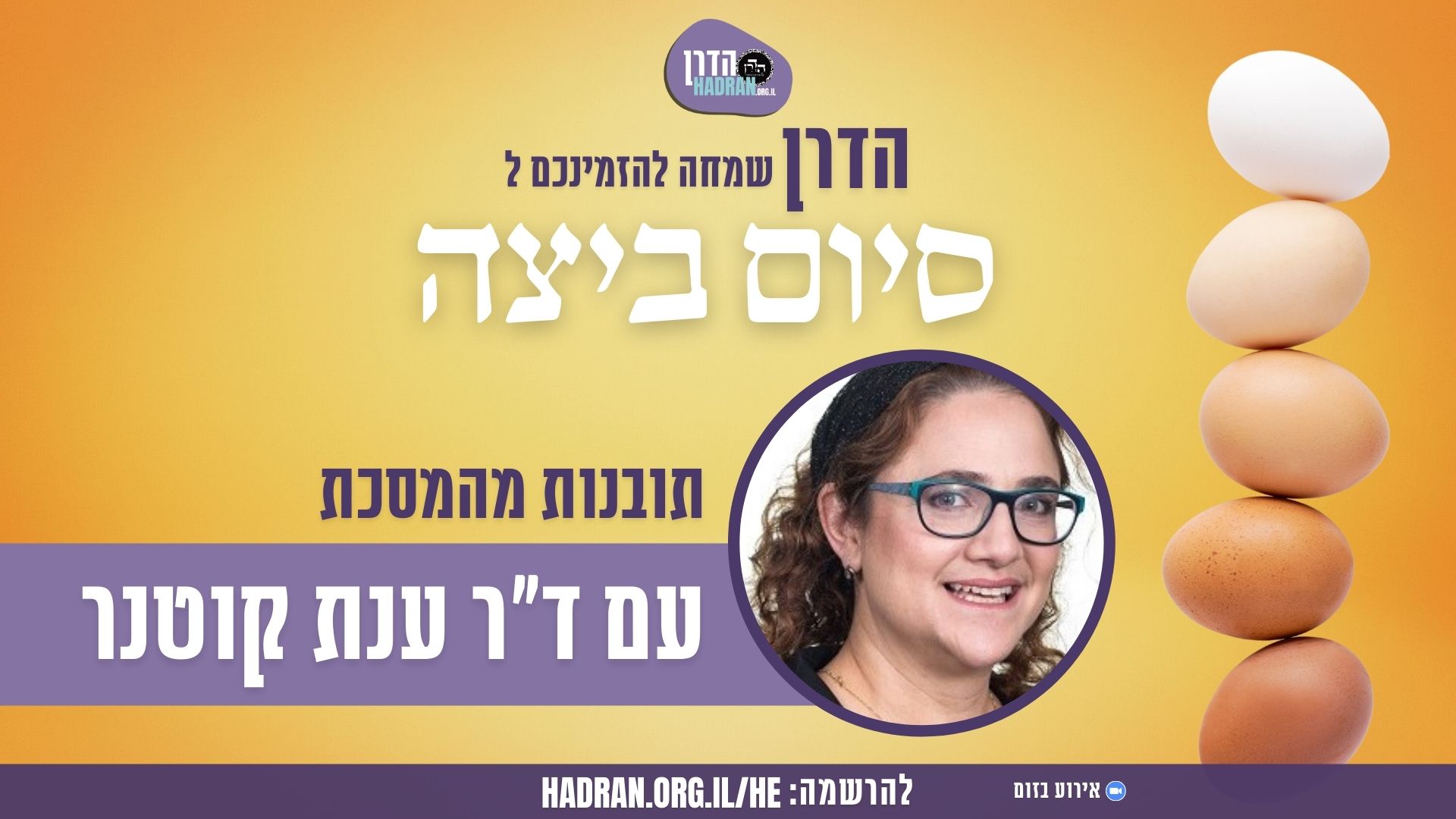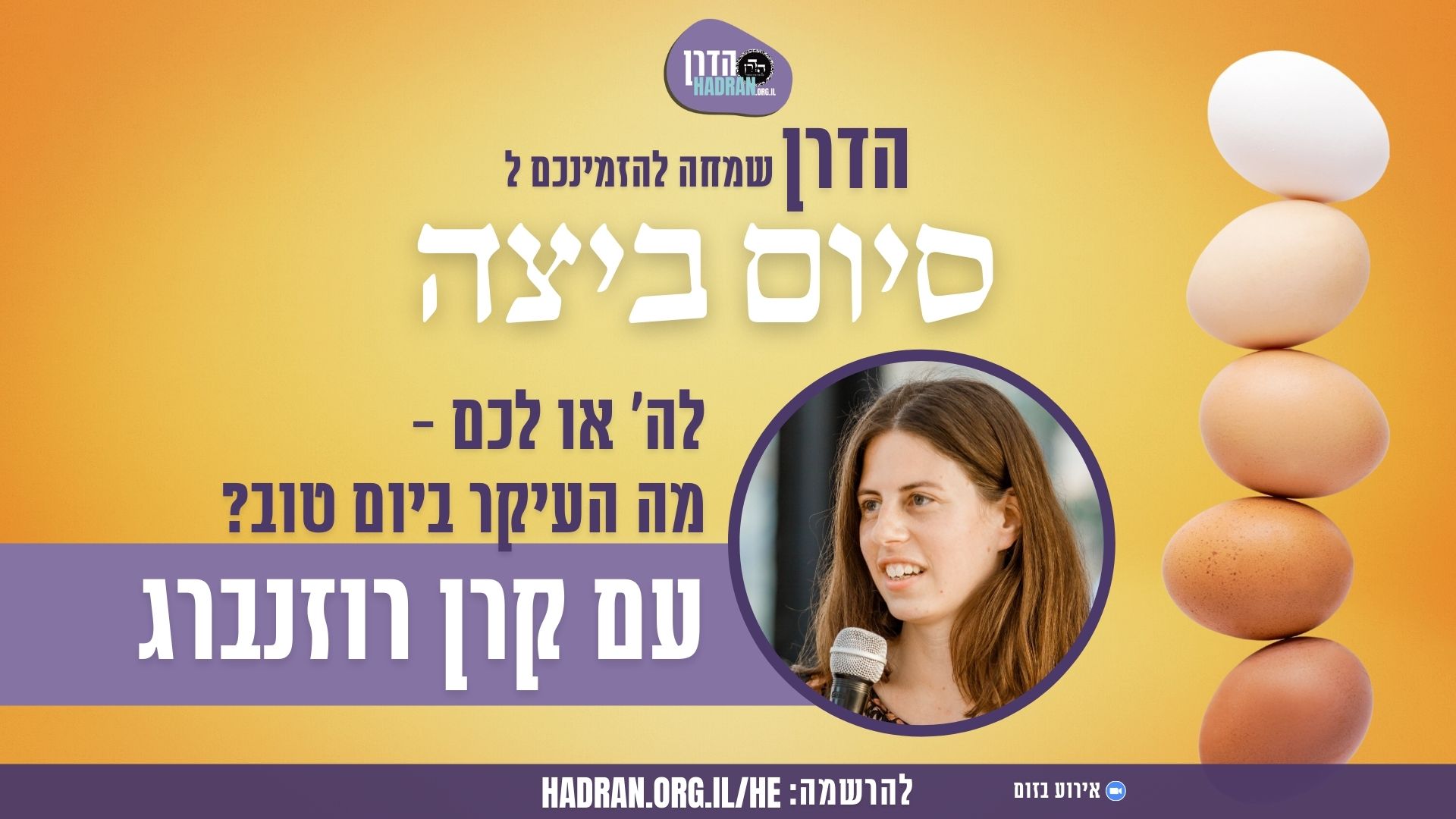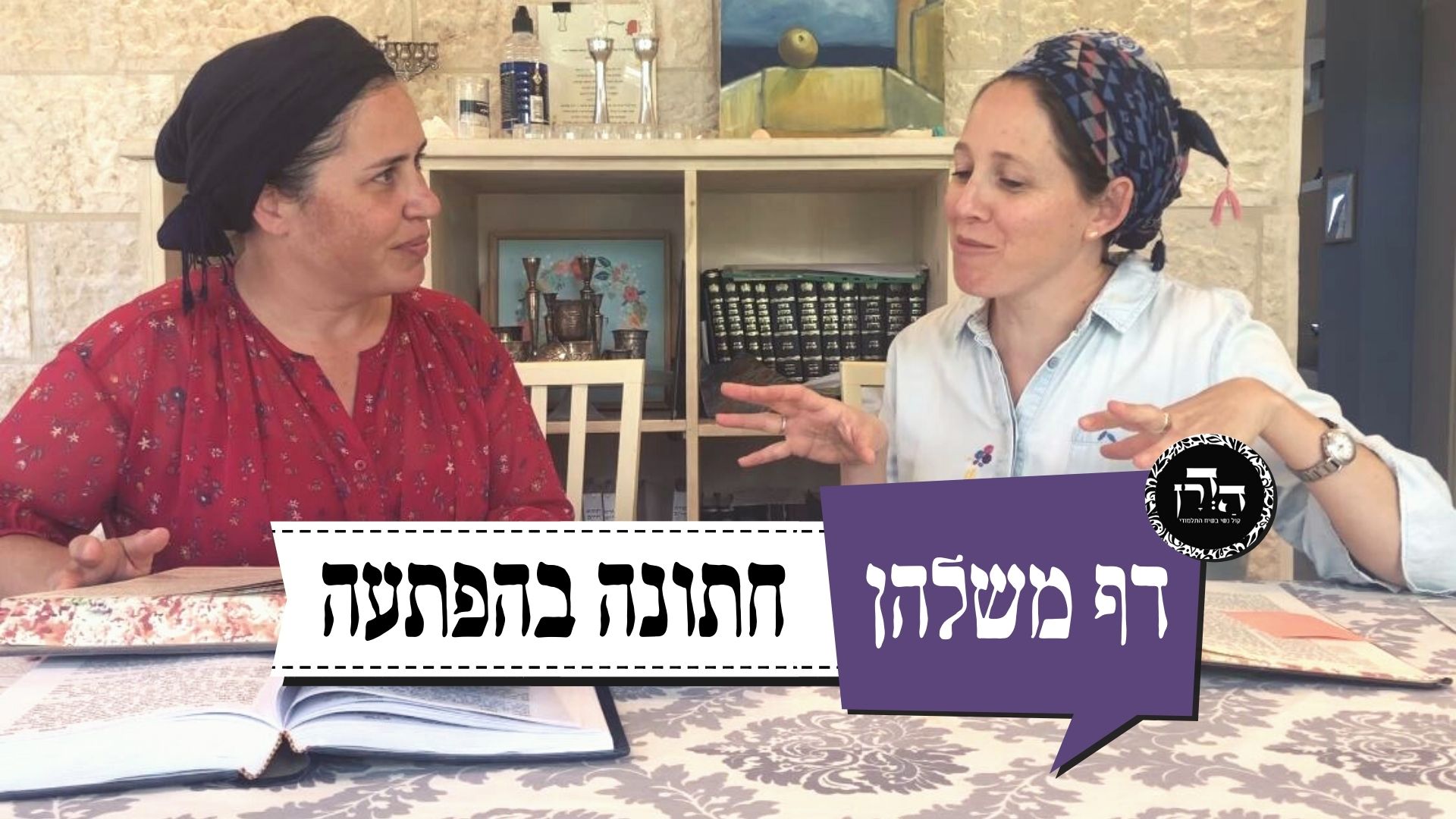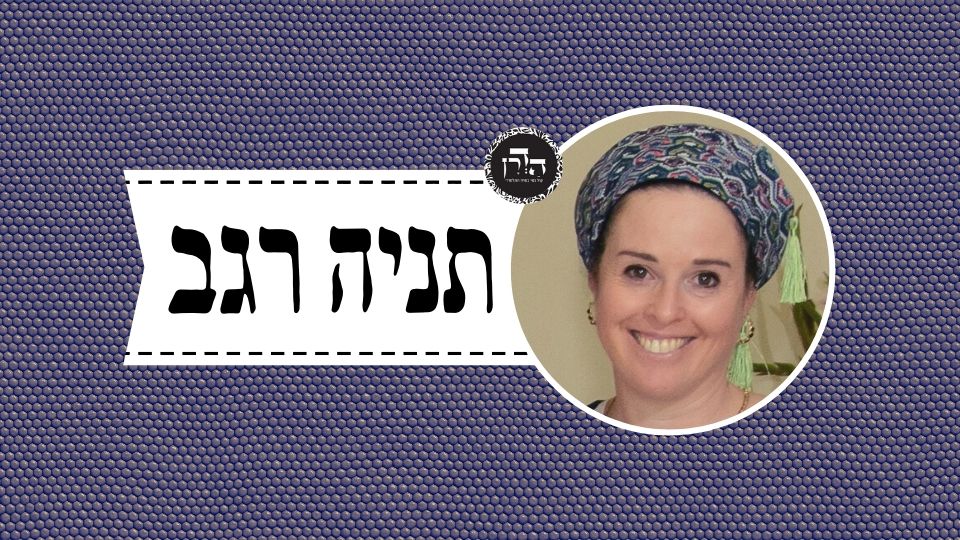ביצה יח
שֶׁמָּא יִטְּלֶנּוּ בְּיָדוֹ, וְיַעֲבִירֶנּוּ אַרְבַּע אַמּוֹת בִּרְשׁוּת הָרַבִּים. אֲמַר לֵיהּ אַבָּיֵי: יֵשׁ לוֹ בּוֹר בַּחֲצֵירוֹ, מַאי אִיכָּא לְמֵימַר? אֲמַר לֵיהּ: גְּזֵירָה בּוֹר בַּחֲצֵרוֹ אַטּוּ בּוֹר בִּרְשׁוּת הָרַבִּים.
lest one come to pick up the vessel in his hand and carry it four cubits in the public domain to a ritual bath. Abaye said to Rabba: If one has a pit full of water of a ritual bath in his courtyard, so that this decree should not apply, what is there to say? Rabba said to him: The Sages issued a decree against immersing vessels even in a pit of water in one’s own courtyard due to a pit situated in the public domain.
הָתִינַח שַׁבָּת, בְּיוֹם טוֹב מַאי אִיכָּא לְמֵימַר? גָּזְרוּ יוֹם טוֹב אַטּוּ שַׁבָּת.
Abaye posed another challenge: This works out well with regard to Shabbat, but with regard to a Festival, when there is no prohibition against carrying from one domain to another, what is there to say? Rabba replied: The Sages issued a decree that it is prohibited to immerse a vessel on a Festival, due to the prohibition against immersing it on Shabbat.
וּמִי גָּזְרִינַן? וְהָא תְּנַן: וְשָׁוִין שֶׁמַּשִּׁיקִין אֶת הַמַּיִם בִּכְלִי אֶבֶן לְטַהֲרָן, אֲבָל לֹא מַטְבִּילִין. וְאִי אִיתָא — נִגְזוֹר הַשָּׁקָה אַטּוּ הַטְבָּלָה!
The Gemara asks: And do we issue a decree in such a case? But didn’t we learn in the mishna: And Beit Shammai and Beit Hillel both agree that one may bring ritually impure water into contact with ritually pure water in stone vessels in order to purify the water. However, one may not immerse the impure water in a ritually impure vessel in order to purify the vessel at the same time. And if it is so that such a decree was issued, let us also decree here that bringing ritually impure water into contact with ritually pure water is prohibited due to the prohibition against immersing a ritually impure vessel in a ritual bath.
וְתִסְבְּרָא? אִי אִית לֵיהּ מַיִם יָפִים, הָנֵי לְמָה לִי לְמֶעְבַּד לְהוּ הַשָּׁקָה? אֶלָּא דְּלֵית לֵיהּ, וְכֵיוָן דְּלֵית לֵיהּ מִזְהָר זְהִיר בְּהוּ.
The Gemara rejects this challenge: And how can you understand that there is substance to this question? If he has other good, ritually pure, water to drink, why do I need to bring this ritually impure water into contact with the ritually pure water? Rather, one must say that he does not have suitable drinking water, and since he does not have other water, he is particularly careful about this water, so that it not become impure. Therefore, perforce, this must be an exceptional case, as the water became impure despite the precautions that were taken; and the Sages did not apply their decrees to unusual cases.
אֵיתִיבֵיהּ: מַדְלִין בִּדְלִי טָמֵא, וְהוּא טָהוֹר. וְאִי אִיתָא, נִגְזוֹר דִּלְמָא אָתֵי לְאַטְבּוֹלֵיהּ בְּעֵינֵיהּ! שָׁאנֵי הָתָם, מִתּוֹךְ שֶׁלֹּא הוּתְּרָה לוֹ אֶלָּא עַל יְדֵי דׇּלְיוֹ — זָכוּר הוּא.
Abaye raised an objection from the following baraita: One may draw water from a spring or a ritual bath on a Festival with a ritually impure pail, and the pail becomes ritually pure because while being filled with water, the bucket is completely immersed in the ritual bath. And if it is so that the Sages issued such a decree, let us also decree here that it is prohibited to draw water on Festival with a ritually impure pail lest one come to immerse the pail by itself. Rabba answered: It is different there; since it is permitted for him to immerse the pail only by drawing water with it, he remembers that it is prohibited to immerse a vessel by itself, and therefore there is no reason to issue a decree.
אֵיתִיבֵיהּ: כְּלִי שֶׁנִּטְמָא מֵעֶרֶב יוֹם טוֹב — אֵין מַטְבִּילִין אוֹתוֹ בְּיוֹם טוֹב, בְּיוֹם טוֹב — מַטְבִּילִין אוֹתוֹ בְּיוֹם טוֹב. וְאִם אִיתָא, נִגְזוֹר דְּיוֹם טוֹב אַטּוּ דְּעֶרֶב יוֹם טוֹב! טוּמְאָה בְּיוֹם טוֹב מִלְּתָא דְּלָא שְׁכִיחָא הִיא, וּמִלְּתָא דְלָא שְׁכִיחָא לָא גְּזַרוּ בַּהּ רַבָּנַן.
Abaye raised an objection from a different baraita, in which it was taught: With regard to a vessel that was rendered ritually impure on the eve of a Festival, one may not immerse it on the Festival; however, if it became impure on the Festival itself, one may immerse it on the Festival. And if it is so that the Sages issued such a decree, let us also decree here that it is prohibited to immerse a vessel that became impure on a Festival due to the prohibition against immersing a vessel that became impure on the eve of a Festival. Rabba answered: Contracting ritual impurity on a Festival, when all are ritually pure, is an uncommon occurrence, and the general principle is that in the case of an uncommon occurrence, the Sages did not issue a decree as a preventive measure.
אֵיתִיבֵיהּ: כְּלִי שֶׁנִּטְמָא בְּאַב הַטּוּמְאָה — אֵין מַטְבִּילִין אוֹתוֹ בְּיוֹם טוֹב, בִּוְלַד הַטּוּמְאָה — מַטְבִּילִין אוֹתוֹ בְּיוֹם טוֹב. וְאִם אִיתָא, נִגְזוֹר הָא אַטּוּ הָא!
Abaye raised yet another objection from the following baraita: With regard to a vessel that was rendered ritually impure by a primary source of impurity, one may not immerse it on a Festival. However, if it was rendered impure only by a derivative source of impurity, meaning that the vessel came into contact with an object that was rendered impure by a primary source of impurity, so that the object has the status of first-degree ritual impurity and confers upon the vessel the status of second-degree ritual impurity, a type of impurity that applies to vessels only by rabbinic decree; in such a case, one may immerse the vessel on a Festival. And if it is so that the Sages issued such a decree, let us also decree here that it is prohibited to immerse this, a vessel rendered impure by a derivative source of impurity, due to the prohibition to immerse that, a vessel rendered impure by a primary source of impurity.
וְלַד הַטּוּמְאָה הֵיכִי מַשְׁכַּחַתְּ לַהּ? גַּבֵּי כֹהֲנִים — כֹּהֲנִים זְרִיזִין הֵם.
Rabba replied: Where do you find a case where people are particular about purifying a vessel that contracted ritual impurity from a derivative source of impurity? It is only in one situation, namely, with regard to priests, since they eat teruma, and teruma contracts ritual impurity even from a vessel that came into contact with only a derivative source of impurity. An ordinary person, who eats non-consecrated produce, does not go to the trouble of purifying such a vessel, since regular produce contracts ritual impurity only from a vessel that came into contact with a primary source of impurity, but not from a vessel that came into contact with a derivative source of impurity. And as for priests, the general principle is that priests are vigilant; they are careful not to allow their vessels to become impure. Therefore, impurity in the case of priests is considered a rare occurrence, with regard to which the Sages did not issue a decree.
תָּא שְׁמַע, דְּאָמַר רַב חִיָּיא בַּר אָשֵׁי אָמַר רַב: נִדָּה שֶׁאֵין לָהּ בְּגָדִים — מַעֲרֶמֶת וְטוֹבֶלֶת בִּבְגָדֶיהָ. וְאִם אִיתָא, נִגְזוֹר דִּלְמָא אָתֵי לְאַטְבּוֹלֵי בְּעֵינַיְיהוּ!
The Gemara further suggests: Come and hear a different proof, as Rav Ḥiyya bar Ashi said that Rav said: A menstruating woman who has no ritually pure clothes to wear after she immerses herself in a ritual bath to purify herself, as all her clothes had become impure, and it is Shabbat or a Festival, when she is unable to immerse them, may employ an artifice to circumvent the prohibition and immerse herself in her clothes. She is permitted to purify herself, and when she immerses herself while wearing her garments, they become purified at the same time. And if it is so that the Sages issued such a decree, let us also decree that it is prohibited for the woman to immerse herself in her clothes lest she come to immerse the clothes by themselves.
שָׁאנֵי הָתָם, מִתּוֹךְ שֶׁלֹּא הוּתְּרָה לָהּ אֶלָּא עַל יְדֵי מַלְבּוּשׁ — זְכוּרָה הִיא.
The Gemara answers: It is different there; since it is permitted for her to immerse the clothes only by wearing them as garments, she remembers that it is prohibited to immerse them by themselves and will not come to violate this prohibition.
רַב יוֹסֵף אָמַר: גְּזֵרָה מִשּׁוּם סְחִיטָה.
Apropos Rabba’s view that one may not immerse a vessel on Shabbat lest he come to carry it four cubits in the public domain, Rav Yosef said that it is prohibited to immerse a vessel on Shabbat for a different reason: It is a decree issued by the Sages as a preventive measure due to the prohibition against wringing. After immersing certain items, such as clothes, one might come to wring them, and this is prohibited on Shabbat and Festivals as a subcategory of the biblically prohibited labor of threshing.
אֲמַר לֵיהּ אַבָּיֵי: תִּינַח כֵּלִים דִּבְנֵי סְחִיטָה נִינְהוּ. כֵּלִים דְּלָאו בְּנֵי סְחִיטָה נִינְהוּ, מַאי אִיכָּא לְמֵימַר? אֲמַר לֵיהּ: גְּזֵרָה הָנֵי אַטּוּ הָנֵי. אֵיתִיבֵיהּ כֹּל הָנֵי תְּיוּבָתָא, וְשַׁנִּי לֵיהּ כִּדְשַׁנִּינַן.
Abaye said to Rav Yosef: This works out well with regard to vessels that are fit for wringing, such as clothes, but with regard to vessels that are not fit for wringing, what is there to say? Rav Yosef said to him: The Sages issued a decree against these vessels, which cannot be wrung, due to those vessels, which can be wrung. Abaye raised against Rav Yosef all of these objections that he had raised against Rabba, in an attempt to prove that the Sages did not issue such a decree, and Rav Yosef answered him as we answered in the name of Rabba.
רַב בִּיבִי אָמַר: גְּזֵרָה שֶׁמָּא יְשַׁהֶא. תַּנְיָא כְּווֹתֵיהּ דְּרַב בִּיבִי: כְּלִי שֶׁנִּטְמָא מֵעֶרֶב יוֹם טוֹב — אֵין מַטְבִּילִין אוֹתוֹ בְּיוֹם טוֹב, גְּזֵרָה שֶׁמָּא יְשַׁהֶא.
Rav Beivai said a different reason: The prohibition against immersing a vessel on a Festival is a decree issued by the Sages lest one come to delay the immersion of his impure vessels. Were the Sages to permit him to immerse vessels on a Festival, he might delay immersing all of his impure vessels until the Festival, when he has more free time; and were he to leave ritually impure vessels in his possession for a lengthy period, he might come to defile items that must be kept ritually pure, such as teruma. The Gemara comments: It is taught in a baraita in accordance with the opinion of Rav Beivai: With regard to a vessel that became ritually impure on the eve of a Festival, one may not immerse it on a Festival, due to a decree lest he come to delay and keep impure vessels in his home in order to immerse them on the Festival.
רָבָא אָמַר: מִפְּנֵי שֶׁנִּרְאֶה כִּמְתַקֵּן כְּלִי. אִי הָכִי, אָדָם נָמֵי! אָדָם נִרְאֶה כְּמֵיקֵר.
Rava said yet a different reason: It is prohibited to immerse a vessel on Shabbat because it looks as if he is repairing the vessel. Since the vessel was previously unfit for use, and the act of immersion renders it usable, this is similar to the repair of a vessel, which Torah law proscribes on Shabbat and Festivals. The Gemara challenges this understanding: If so, a person should likewise be prohibited to immerse himself, because it looks as if he is repairing himself through purification. The Gemara answers: A person undergoing immersion looks as if he is cooling himself. Since it is not clearly evident that he is immersing in order to purify himself, as he might be bathing for his pleasure, there is no reason to prohibit the immersion.
הָא תִּינַח מַיִם יָפִים, מַיִם רָעִים מַאי אִיכָּא לְמֵימַר? אָמַר רַב נַחְמָן בַּר יִצְחָק: פְּעָמִים שֶׁאָדָם בָּא
The Gemara challenges this explanation: This works out well in a case where he immerses himself in good, clean water, in which it would be a pleasure to bathe; but if he immerses himself in bad, murky water, as the water of a ritual bath is not always sufficiently clean, what is there to say? Rav Naḥman bar Yitzḥak said: Even in that case, his actions do not prove that his intention is to purify himself, as sometimes a person comes home
בַּשָּׁרָב, וְרוֹחֵץ אֲפִילּוּ בְּמֵי מִשְׁרָה.
on a hot day and washes himself even in putrid water in which flax was soaked, because the heat has made him so uncomfortable.
תִּינַח בִּימוֹת הַחַמָּה, בִּימוֹת הַגְּשָׁמִים מַאי אִיכָּא לְמֵימַר? אָמַר רַב נַחְמָן בַּר יִצְחָק: פְּעָמִים שֶׁאָדָם בָּא מִן הַשָּׂדֶה מְלוּכְלָךְ בְּטִיט וּבְצוֹאָה, וְרוֹחֵץ אֲפִילּוּ בִּימוֹת הַגְּשָׁמִים.
The Gemara raises another objection: This works out well in the summer season; however, in the rainy season, when people do not usually immerse themselves in water in order to cool off, what is there to say? Rav Naḥman bar Yitzḥak said: Sometimes a person comes home from the field soiled with mud and excrement and washes himself even in the rainy season.
תִּינַח בְּשַׁבָּת, בְּיוֹם הַכִּפּוּרִים מַאי אִיכָּא לְמֵימַר?
The Gemara continues with another objection: This works out well and explains why it is permitted for one to immerse himself on Shabbat, when it is permitted to wash, and therefore it can be argued that it is not clearly evident that he is immersing in order to purify himself; but on Yom Kippur, when all bathing apart from ritual immersion is prohibited, what is there to say? His actions prove that his intention is to purify himself, and this should be prohibited because it looks as though he is repairing himself through purification.
אָמַר רָבָא: מִי אִיכָּא מִידֵּי דִּבְשַׁבָּת שְׁרֵי וּבְיוֹם הַכִּפּוּרִים אָסוּר? אֶלָּא הוֹאִיל וּבְשַׁבָּת שְׁרֵי — בְּיוֹם הַכִּפּוּרִים נָמֵי שְׁרֵי.
Rava said: It is impossible to prohibit immersion on Yom Kippur alone, as is there anything that is permitted on Shabbat and the very same act is prohibited as labor on Yom Kippur? In fact, the prohibition against labor is more stringent on Shabbat than on Yom Kippur. Rather, since it is permitted on Shabbat, it is also permitted on Yom Kippur. The Sages did not issue decrees with regard to Yom Kippur that would make it more stringent than Shabbat. Therefore, since they allowed a person to immerse on Shabbat because it looks as if he is doing so for pleasure, to escape the heat or to remove dirt, and not necessarily in order to purify himself, they permitted it on Yom Kippur as well, even though it is evident in that situation that his immersion is for the purpose of achieving purity.
וּמִי אִית לֵיהּ לְרָבָא ״הוֹאִיל״? וְהָתְנַן: הַחוֹשֵׁשׁ בְּשִׁינָּיו — לֹא יְגַמֵּעַ בָּהֶן אֶת הַחוֹמֶץ, אֲבָל מְטַבֵּל הוּא כְּדַרְכּוֹ, וְאִם נִתְרַפֵּא — נִתְרַפֵּא. וְרָמֵינַן עֲלַהּ: לֹא יְגַמֵּעַ וּפוֹלֵט, אֲבָל מְגַמֵּעַ וּבוֹלֵעַ!
The Gemara asks: Does Rava accept the principle of: Since? But didn’t we learn in a mishna: One who is concerned about pain in his teeth may not sip vinegar through them on Shabbat in order to alleviate his toothache; however, he may dip his food in vinegar in his usual manner during the meal and eat it, and if he is healed by the vinegar, he is healed. And we raised a contradiction to this mishna from the following baraita: One may not sip vinegar and immediately spit it out, as this is clearly done for medicinal purposes; however, one may sip the vinegar and swallow it, since it looks as though he is drinking it. This indicates that there is a permitted way to use vinegar even without dipping his food into it.
וַאֲמַר אַבָּיֵי: כִּי תְּנַן נָמֵי מַתְנִיתִין, מְגַמֵּעַ וּפוֹלֵט תְּנַן. וְרָבָא אָמַר: אֲפִילּוּ תֵּימָא מְגַמֵּעַ וּבוֹלֵעַ, וְלָא קַשְׁיָא: כָּאן קוֹדֶם טִבּוּל, כָּאן לְאַחַר טִבּוּל.
And Abaye said: Also when we learned this ruling in the mishna, we learned it with regard to the case of one who sips and spits it out. Rava said: Even if you say that the mishna prohibits sipping vinegar even in a case where one sips and swallows it, it is still not difficult: Here, the baraita permits sipping vinegar before dipping one’s food in it, as he appears to be doing so for pleasure. There, the mishna prohibits sipping the vinegar after dipping his food in it, when it is clear that one is doing so for medicinal purposes only.
וְאִם אִיתָא, נֵימָא: הוֹאִיל וְקוֹדֶם טִבּוּל שְׁרֵי — לְאַחַר טִבּוּל נָמֵי שְׁרֵי! הֲדַר בֵּיהּ רָבָא מֵהַהִיא.
The Gemara completes its question: And if it is so that Rava accepts the principle of: Since, let him say: Since it is permitted to sip vinegar before dipping, it is also permitted to do so after dipping. The Gemara answers: Rava retracted that statement with regard to vinegar and accepted Abaye’s resolution of the difficulty, along with the principle of: Since.
וּמִמַּאי דְּמֵהַהִיא הֲדַר בֵּיהּ, דִּלְמָא מֵהָא הֲדַר בֵּיהּ? לָא סָלְקָא דַּעְתָּךְ, דְּתַנְיָא: כׇּל חַיָּיבֵי טְבִילוֹת טוֹבְלִין כְּדַרְכָּן, בֵּין בְּתִשְׁעָה בְּאָב בֵּין בְּיוֹם הַכִּיפּוּרִים.
The Gemara asks: And from where can it be determined that he retracted that teaching? Perhaps he retracted this statement with regard to immersion in a ritual bath on Yom Kippur. The Gemara answers: This cannot enter your mind that he retracted his view in that case, as it is taught in a baraita: All who are obligated in immersions immerse in their usual manner, both on the Ninth of Av and on Yom Kippur, even though it is prohibited to wash on these days. Rava would certainly have aligned his opinion with the explicit ruling of a baraita.
וְשָׁוִין שֶׁמַּשִּׁיקִין אֶת הַמַּיִם בִּכְלִי אֶבֶן וְכוּ׳. מַאי ״אֲבָל לֹא מַטְבִּילִין״? אָמַר שְׁמוּאֵל: אֵין מַטְבִּילִין אֶת הַכְּלִי עַל גַּב מֵימָיו לְטַהֲרוֹ בְּיוֹם טוֹב.
§ It was taught in the mishna: And Beit Shammai and Beit Hillel both agree that one may bring ritually impure water into contact with ritually pure water in stone vessels in order to purify the water. However, one may not immerse the impure water. The Gemara asks: What is the meaning of the mishna’s statement: However, one may not immerse the impure water? Shmuel said: One may not immerse an impure vessel on account of its water in order to purify it on a Festival. The Sages allowed impure water to be purified through contact with ritually pure water only in a stone vessel or in another vessel that does not contract impurity, but not in an impure vessel that would itself become purified through this immersion.
מַנִּי מַתְנִיתִין? לָא רַבִּי וְלָא רַבָּנַן, דְּתַנְיָא: אֵין מַטְבִּילִין אֶת הַכְּלִי עַל גַּב מֵימָיו לְטַהֲרוֹ, וְאֵין מַשִּׁיקִין אֶת הַמַּיִם בִּכְלִי אֶבֶן לְטַהֲרָן, דִּבְרֵי רַבִּי. וַחֲכָמִים אוֹמְרִים: מַטְבִּילִין כְּלִי עַל גַּב מֵימָיו לְטַהֲרוֹ, וּמַשִּׁיקִין אֶת הַמַּיִם בִּכְלִי אֶבֶן לְטַהֲרָן.
The Gemara asks: If that is its meaning, in accordance with whose opinion is the mishna? It is not in accordance with the opinion of Rabbi Yehuda HaNasi nor with that of the Rabbis. As it is taught in the Tosefta: One may not immerse an impure vessel on account of its water in order to purify the vessel, and one may not bring impure water into contact with pure water in a stone vessel in order to purify the water; this is the statement of Rabbi Yehuda HaNasi. And the Rabbis say: One may immerse an impure vessel on account of its water in order to purify the vessel, and one may bring impure water into contact with pure water in a stone vessel in order to purify the water.
מַנִּי? אִי רַבִּי — קַשְׁיָא הַשָּׁקָה, אִי רַבָּנַן — קַשְׁיָא הַטְבָּלָה!
If so, in accordance with whose opinion is the mishna? If it is in accordance with the opinion of Rabbi Yehuda HaNasi, then the ruling with regard to bringing impure water into contact with pure water in a stone vessel is difficult, as in the Tosefta Rabbi Yehuda HaNasi prohibits doing so, whereas the mishna permits it; and if it is in accordance with the opinion of the Rabbis, then the ruling with regard to the immersion of an impure vessel on account of its water is difficult, as in the Tosefta the Rabbis permit this, while the mishna, as explained by Shmuel, prohibits it.
אִיבָּעֵית אֵימָא רַבִּי, אִיבָּעֵית אֵימָא רַבָּנַן. אִי בָּעֵית אֵימָא רַבִּי: רֵישָׁא דְּבָרַיְיתָא בְּיוֹם טוֹב, וְסֵיפָא בְּשַׁבָּת, וְכוּלַּהּ מַתְנִיתִין בְּיוֹם טוֹב.
The Gemara answers: If you wish, say that the mishna is in accordance with the opinion of Rabbi Yehuda HaNasi; and if you wish, say instead that it is in accordance with the opinion of the Rabbis. How so? If you wish, say that the mishna is in accordance with the opinion of Rabbi Yehuda HaNasi and explain that the first clause of that baraita, i.e., the first part of Rabbi Yehuda HaNasi’s statement in the Tosefta, deals with a Festival; it is in that case that Rabbi Yehuda HaNasi prohibits immersing an impure vessel on account of its water, but bringing impure water into contact with pure water in a stone vessel would be permitted. And the latter clause, which extends the prohibition to bringing impure water into contact with pure water, is referring to the more stringent case of Shabbat. And the entire mishna is referring to a Festival, when it is permitted to purify impure water by bringing it into contact with pure water in a stone vessel.
































